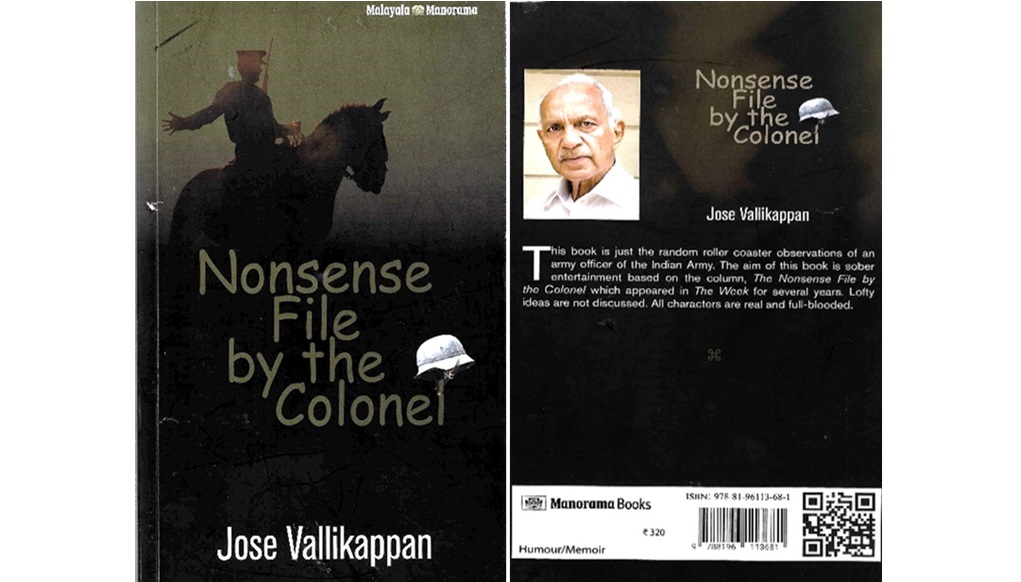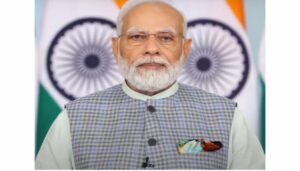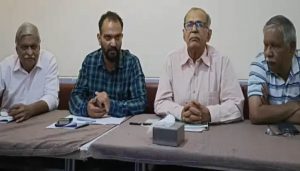BOOK REVIEW: NONSENSE FILE BY THE COLONEL

By
Maj Gen Jagatbir Singh,VSM ( Retd)
‘Nonsense File’ written by Colonel Jose Vallikappan is a compilation of his articles which were published in ‘The Week ‘Magazine is a memoir which while full of humour is also a serious side to it, in which he talks of personalities who have shaped and career and influenced him. He also gives the reader an insight into his remarkable achievements and the ‘way of life’ in the Army. Basically, the stories can be divided into three parts those dealing with his early life, followed by his time in the Army and finally his service with Malayala Manorama.
Belonging to a planter’s family hailing from Teekoy in the backwaters of Kottayam District in Kerela, Vallikappan’s grandfather ‘was a man of means’ and had even ‘had a private audience with the Pope in Rome’ but after his death ‘there was a steep decline in the family fortunes’. He did his schooling from St Joseph’s European High School Bangalore, where he excelled in sports being Best Athlete. He then went on to study Economics in St Stephens College where he broke the Delhi University record in 400 meters, was a classmate of Mani Shankar Aiyer and Arun Shourie and in a star-studded class was ‘selected as the best undergraduate of 1961’.
An IAS father of a schoolmate of his advised him not to join the Army;’ as it was an organization that never had to fight;’ however the Army fought three major wars against the Chinese and Pakistanis in a short span which speaks volumes of his ‘Himalayan ineptitude’.
He recalls his days in the Indian Military Academy as a ‘nightmare’, which included reporting to senior cadets after lights out in full battle order; ‘Chindit Order’ on wintery nights. But he recalls how he was soon transformed from a ’softy’ to being ‘tough and brave’. He writes about Pankaj Joshi a friend and course mate who always wanted to join the Gorkhas, he proved to be the ‘bravest of the brave’ and rose to be a Lieutenant General despite losing both his legs in war. The Cadets of course ‘adored ‘and were ‘inspired’ their Commandant General Prem Bhagat who had been awarded with the Victoria Cross.
He was commissioned into 18 Cavalry one of the oldest Regiments then stationed in Patiala and ended up spending most of his service life in Punjab. While a majority of the stories naturally relate to the ‘Eighteenth’ the reader is exposed to both ‘humour in uniform’ and the more serious side of the life in the Army.
Colonel Vallikappan regales the reader with anecdotes of Bali One Eight, who had a fondness for drinks waking up one morning complaining ‘that he was paralysed from his waist downwards’; surprisingly; ‘both his legs were in one side of his pyjamas. Then you have a shikar where in spite of strict instructions from the CO to a young burly Sikh Officer to remain seated in the rear seat, he stood up only to land on the Colonel of the Regiment, when the jeep braked for him to take a shot at a partridge. Captain Ranjit Talwar who thought he had lined up a perfect shot for General Kaycee, looked to his left after braking and heard a muffled ‘ouch’. Unfortunately, Second Lieutenant Amarjit had the ‘capacity to forget things very fast’ and comically the same was repeated a few minutes later before he was sent to the 1 Ton truck following behind by Lieutenant Colonel Hari Singh whose moustache was bristling in rage.
‘No one writes to the Colonel’ is about how he wrote to his Commandant asking for two months leave for the next year while on his Annual Leave in December 1963.After posting the letter he could not sleep imagining a scowling CO but he was taken aback when the reply from Lieutenant Colonel Hari Singh arrived in a stylish letterhead granting his leave in spite of the ‘stupid rules’ which demands attendance in the Regiment at the end of the leave of the previous year.
He recalls a hilarious incident when he was about to witness a Polo Match in Ahmed Nagar as a young Captain when his Commanding Officer ordered him to refer the match, he protested saying he never knew the rules and ‘he could hardly ride a horse’ but was told; “if you cannot gallop, trot, if you cannot trot walk, if you cannot walk be stationery but whistle you must”. That’s how things are mastered in the Army; ‘a headlong plunge into unknown waters’.
The character of some of the finest Generals are also wonderfully revealed. There is the story of a young officer hitting the bar in Jullunder and getting on well with a gregarious old man till his fifth drink, when he asked him what he did for a living. The old man replied; ‘he played golf’ when pressed by Joe he replied I also command a Corps’. That was General Henderson Brooks. A similar incident occurred with General Sam Manekshaw when he was the Army Commander in Shimla, in this case dressed in a suit he even carried the young officer to his room in the wee hours of the morning after a round of drinks in the Mess. Next morning when the officer was taken for his customary interview on arrival, he was shocked to find that the swashbuckling officer he encountered the previous night of inebriation was none other than the Army Commander, who hugged him and gave him a hearty welcome. Both these stories were the part of Army folklore when he was growing up. Such were those men who were both loved and respected!
General Sunderji as the First Armoured Divisional Commander gave the author and his Brigade Commander a rare insight into the nuances of Desert Warfare, while their jeep was being repaired on the deserts tracks of Suratgarh. To senior officers he was a great asset who in the shortest possible time could produce a paper on the most complicated subject in the simplest of language within a page. Young officers loved him for his scintillating conversation. Once when a Brigadier spotted him drinking rum from an ordinary glass, then Major Vallikappan was asked to change the glass to a crystal glass, the General took the glass but said; ‘change the container but never the contents.’
He recounts being a student in Staff College when General Jacob came to address them at the end of the 1971 War, he seemed to require help to wake him up after the Commandant had introduced him, but he started with a bang and held the audience spellbound by his rhetoric and phenomenal memory with all facts and figures on his fingertips. Needless to say, there was a standing ovation and the audience wished he would carry on.
Such was the quality of these outstanding military leaders approachable, friendly, brilliant and yet humane. They left an indelible impression and made stellar contributions while in Service.
Joe was in Ahmed Nagar doing a Course when the 1965 War broke out and was rushed to the Sialkot Sector to join the Regiment. On reporting to the Adjutant at night he was insistent that he be sent to the forward troops. Unfortunately, the jeep lost its way and entered ‘no man’s land’. He was blown up on a minefield but survived with a back and leg injury which saw him being part of the evacuation chain all the way back to Cochin.
He recalls a course mate Joso Sengupta who he considers to be brilliant and who had also joined his Regiment 16 Cavalry from Ahmed Nagar at the same time. Unfortunately, he lost his eyes when his tank was hit. An Army officer’s wife met him at MH Jullunder and after discussing mutual friends she told him to ’keep his spirits up;’ he replied Ma’am; ‘I have lost my eyes not my sprit’. Joso ‘a class apart personified the spirit of a never say die soldier’.
Then there is the story of Major Bhupinder Singh of Hodson’s Horse, undoubtedly the bravest of the brave who was awarded the Maha Vir Chakra. He had been seriously injured during the famous tank battle at Phillora and was in the Military Hospital in Delhi when the Prime Minister Lal Bahadur Shastri visited him. When asked why he had ‘tears in his eyes, he replied; “Sir it is my great misfortune that when the PM is standing in front of me and I cannot do my duty as a good soldier and stand up and salute him.” Unfortunately, he died a few days later.
Annamma Kochamma, the late Mrs KM Mathew was Chief Editor of vanita , the largest selling women’s magazine was ‘one of the most remarkable women’. Her ‘discipline surpassed the military ‘, Once when Col Vallikappan decided to surprise her by doing up her office while she was in Chennai, she surprised him by cancelling the trip, with no room to sit she sat amongst the clerks and said; don’t create a fuss, I also come from poor beginnings’.
This book is a ‘random roller coaster’ of anecdotes over a period of time particularly as an Army Officer. It is written in a remarkable style which is easy to read but with wit and finesse that is hard to match. Colonel Vallikappan has the knack of capturing the personalities of the people and sharing his experiences with a reader thereby giving a rare insight into his unique experiences. It makes sense to read this delightful book.








